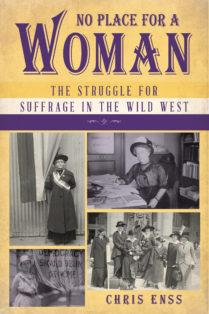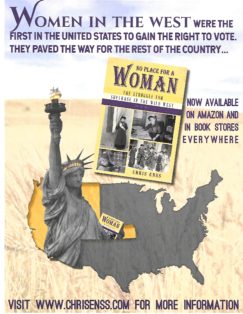Enter now to win a copy of the new book
No Place for a Woman: The Fight for Suffrage in the Wild West.

Never doubt that a small group of thoughtful, committed citizens can change the world; indeed, it’s the only thing that ever has.
Margaret Mead
July 9, 1848, Waterloo, New York. It was a hot Sunday afternoon, and Jane Hunt, wife to prominent Quaker Richard P. Hunt, was home tending her two-week-old daughter and awaiting the arrival of the guests she expected for afternoon tea. Hunt’s home, an elegant, federal-style mansion, was comfortable and well-appointed, though not overtly luxurious, as befit her Quaker faith. It was the perfect venue for a meeting between a group of local Quaker women and renowned speaker, minister, and champion of reform Lucretia Mott, who was in the area visiting from Philadelphia. Mott, a Quaker minister, had been speaking openly in public and advocating fiercely for the abolition of slavery since the 1830s.
Hunt likely looked forward to the tea party and to the lively discussion she expected with Mott; her friend and fellow Quaker Mary Ann McClintock; Mott’s sister, Martha Wright; and an acquaintance of Mott’s named Elizabeth Cady Stanton. Mary Ann McClintock was the wife of the local Quaker minister—both she and he were adherents to a branch of Quakerism called Hicksites, which promoted equality between the sexes. Martha Wright was well known for her intellect, her witty commentary, and for her support of her sister’s work and beliefs. Elizabeth Cady Stanton, who had first met Mott when the two were excluded from participation in the 1840 World’s Anti-Slavery Convention in London on the basis of their sex, was also in attendance as she was visiting from nearby Seneca Falls, New York. Stanton took the opportunity, while the women enjoyed tea and dainty treats in Hunt’s spacious and comfortable parlor, to unleash “a torrent of [her] long-accumulating discontent,” over the inequality of the sexes.


